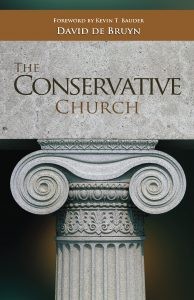What is a conservative Christian?
The answer to this is found by considering what is essential to Christianity, and what therefore needs to be protected and handed down, or conserved. We can summarise essential Christianity with a trinity of orthos.
Orthodoxy. Beginning with the Gospel itself, the Christian faith has a body of teaching that provides both the boundary of the faith, and all that is contained therein. This teaching tells us how to be reconciled with God, how to understand God, the world, and ourselves, and how to live lives that are pleasing to Him. We are to teach and defend the Gospel and the whole counsel of God. The truth of orthodoxy must be conserved.
Orthopraxy. Emerging from this orthodoxy will be practices that are right. These practices will include Scripturally-prescribed worship, churches patterned and ordered after Scripture, lives of holiness and true piety, and right applications of Scriptural principles to modern situations. To do this, we will need to be thoughtful Christians that practise the examined life. We believe we must examine life to understand it, and the meanings of the things in our lives. Apart from this, we can never understand how to properly love and obey God. All of life has meaning – from the things we wear, to our tone of voice, to the music we listen to, to the technology around us. For us to be fully Christian, we must consider carefully the meaning of the things around us, and particularly the things that shape meaning. The goodness of orthopraxy must be conserved.
Orthopathy. The Christian life is shaped around the Great Commandment, which is a commandment to love. Our loves, desires, values, or “affections” must be as right as our doctrine and practice. “Ordinate affection” or orthopathy (pathos = affections) means that there is a right way to desire and love God, and a wrong way. Desires, to be right, must be right in two ways. First, they must be correct in degree: we must love God as our ultimate end, and all other loves as means. We must not love anything more than it deserves, or less than it merits. Second, they must be correct in kind: the kind of desire matches the object or nature of thing it desires. We must not give to God (or to any other thing) a kind of desire that does correspond to Him. There are fitting, appropriate and therefore, ordinate responses to God, and inappropriate and therefore inordinate responses. We believe in the importance of knowing what affections are true and ordinate when it comes to responding to God, the world and our experiences. The beauty of orthopathy must be conserved.
In this way, a conservative Christian wishes to conserve the truth, goodness and beauty of essential Christianity: believe the truth, obey the good, and love the beautiful, and hand it on. In order to conserve these essentials, a Christian needs to have what every conservative loves: a respect for tradition. While not slavishly regarding Christian tradition as authoritative, a conservative Christian will lean on and respect Christian doctrine, worship, and practice from history. Contained in the best of Christian tradition is orthodoxy, orthopraxy, and orthopathy. Therefore, we want to remain connected with the evangelical Christian tradition throughout history. We want to build on what we have been handed. We are happy to own our heritage wherever it is found: in the early Church Fathers, the Dark Ages, the Middle Ages, the Renaissance, the Enlightenment or the Modern Era. Having done so, we will do what Kirk calls reconciling permanence and change: we will want to take what is timeless, true and permanent and apply it to our changing world. We desire to be obedient Christians in the present, while honouring and building upon what we have been handed.
Further Resources:A Conservative Christian Declaration, by Kevin T. Bauder, Scott Aniol, David de Bruyn, Michael Riley, Ryan Martin, and Jason Parker



